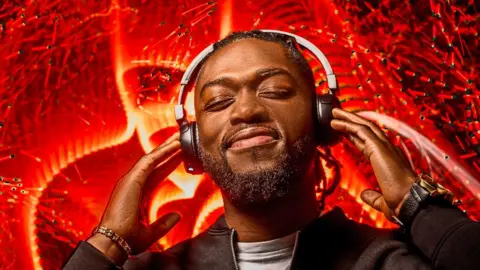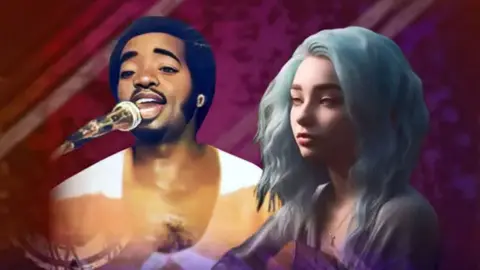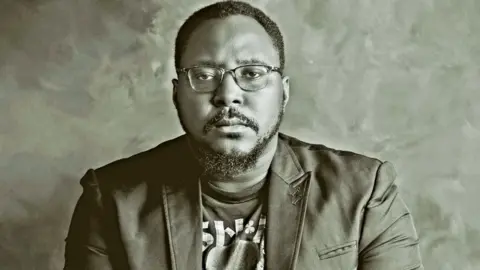 Getty Images
Getty ImagesDescribed as a virtual singer powered by artificial intelligence (AI), Mya Blue says: “I am not the enemy, I am just a music lover exploring the different sounds of the world.”
Her Instagram account, where she makes this statement, has the tag line: “I may not be human but I sing from my soul” – and is the creation of Nigerian musician and producer Eclipse Nkasi.
She features in his recently released remix of Joromi, a classic tune by the late Nigerian highlife artist Sir Victor Uwaifo.
She and her creator want to calm the fears that many musicians the world over have about the impact of AI on the music industry.
Earlier this year, for example, high-profile artists such as Billie Eilish and Nicki Minaj called for a halt to the “predatory” use of AI tools which they say steal artists’ voices.
And given a lack of understanding about AI throughout Africa, and the fact that AI tends to rely on data sources collated in the West, there are concerns about how African music and cultural heritage will be affected.
 Eclipse Nkasi
Eclipse NkasiBut there are many African artists and industry professionals who are excited about the possibilities this emerging technology offers.
Indeed Nkasi says the fact that AI is in its infancy in Africa may be a boon for the continent.
“There is a huge threat, but just saying: ‘Let’s abolish AI’ is not going to work – there are too many countries and people invested,” he told the BBC.
“The best thing we can do is figure out better ways to use it.”
The 33-year-old is determined to be that pioneer and last year also produced the continent’s first AI-powered music album Infinite Echoes.
Nkasi says he has intentionally taken a manual and creative approach to using AI in his music, primarily using it to generate samples.
“My biggest drive with AI is its application, finding healthy ways to apply it. With each project it was important to find something that it did that moved the needle forward,” he says.
But while Nkasi is happy to experiment with the new technology, some see it as a threat to African culture.
For Kenyan musician and producer Tabu Osusa, it heralds the risk of cultural appropriation – with AI passing off African sounds without acknowledging their source.
This is because AI is able to quickly create new compositions by learning from existing music.
“My problem with AI is the ownership. Once you have taken some music from Ghana or Nigeria, who owns that music? How would you find out where the original creators are and ensure they are credited? It’s theft for me through the backroom,” Osusa told the BBC.
“Due to unregulated sampling methods by musicians, AI will enable recording company moguls in the West to make colossal sums of money while leaving some creatives in African villages to languish in abject poverty.”
This fear is reflected in a report released last year by Creatives Garage, a Kenya-based arts platform which worked in collaboration with the Mozilla Foundation to study the impact of AI on the East African nation’s creative communities.
It revealed that most Kenyan musicians were anxious that AI could lead to others benefitting from their creativity, says Bukonola Ngobi, research consultant at Creatives Garage.
The study also warned that AI’s power to store data might sound the death knell for the culture around traditional music.
One musician even questioned whether recording and storing traditional sounds for AI to replicate might be a disincentive for local artists to continue to learn traditional instruments, Ngobi says.
Osusa goes even further: “In Africa we mostly don’t study music, we are born with it. We live it. It’s very spiritual. Music in Africa is always alive. It’s so dynamic. That shouldn’t be taken away from us.”
Yet the report did show that for those with access to tech devices, AI not only provided creative music development but also the chance to develop cheaper marketing and design services.
Although this would be no help for emerging artists from Africa’s poorer communities – and might raise the barrier to pursuing a music career, warned Ngobi.
“If you don’t have a laptop to start off with or you’re a musician in an environment where there is no internet connectivity then how will you participate?” she told the BBC.
 Eclipse Nkasi
Eclipse NkasiFor those wanting to innovate, one of the problems Africa faces is the lack of data from the continent to dictate algorithms. Searches are often shaped by Western biases which decrease the accuracy and quality of work produced by AI for African musicians.
For example, when Nkasi created Mya Blue using AI, he faced issues with her imagery – the artist presents as a Gen Z American girl with blue hair.
“AI is very limited in how it understands and perceives my space,” he says.
But the Nigerian musician views this as an opportunity for human contribution: “The limits we Africans experience with AI can be a good thing.
“One can argue that right now, while AI can’t give the very detailed African sound, there’s still room for the guy who can play it. So I’m not sure what we’re really fighting for when we consider that a problem.”
Fellow Nigerian Emmanuel Ogala, the boss of AI-powered company Josplay, definitely sees the opportunities for Africa.
His company uses AI models to collate detailed metadata and intelligence to create archives of the continent’s diverse music heritage.
“African music is really complex and it’s one of the most understudied types of music,” he told the BBC.
This was reflected at the MTV Video Music Awards in September, when South African musician Tyla won the award for the Best Afrobeats song for her hit Water.
During her acceptance speech she hit out against the tendency of Western award bodies to group all African artists under the umbrella of “Afrobeats” – a genre of music more associated with Nigeria and West Africa.
“African music is so diverse,” she said. “It’s more than just Afrobeats. I come from South Africa. I represent amapiano. I represent my culture.”
Ogala feels AI would address such homogenisation and benefit African musicians by revealing to the world more of the continent’s cultural diversity.
“A lot of the academics we speak to have knowledge that is very specific about a very small area of African music. You have to build for an African audience taking note of how fragmented our listening culture is. You just cannot humanly do that,” he says.
As AI continues to develop, there is consensus among African music artists, producers and researchers that there needs to be better financing.
“We need investment in the data infrastructure for the opportunities it presents to really be leveraged by people,” says Ngobi.
Ogala agrees and says that raising funds to develop his digital archive AI tool is difficult.
“We, the founders, have been funding the project out of our pockets because of our belief in the industry. If we put in place the fundamental building blocks, the industry will be a lot more viable than it is now.”
Added to this are the uncertainties around copyright legislation written for a pre-AI era which will need to be renegotiated. Copyright is already a huge issue for African artists whose music is often pirated, sold and played on the continent without them earning anything.
These challenges aside, there is a growing realisation that unless the African music industry embraces the new technology, it is in danger of losing control of its talent and heritage.
And Nkasi’s Mya Blue certainly has big ambitions.
During a Q&A on her Instagram, replying to a question about whether she could win a Grammy, she said: “Who knows. As an AI [artist], I don’t dream of trophies, but of resonating with hearts through music. But wouldn’t it be fun to see a virtual artist on that stage?”
You may also be interested in:
 Getty Images/BBC
Getty Images/BBC



